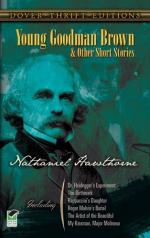|
This section contains 1,560 words (approx. 6 pages at 300 words per page) |

|
SOURCE: “‘Young Goodman Brown’ and Puritan Justification,” in Studies in Short Fiction, Vol. 11, No. 2, Spring, 1974, pp. 200-03.
In the following essay, Johnson discusses “Young Goodman Brown” in light of the Puritan doctrine of justification—the idea that God will “justify” sinners who recognize themselves as such and seek divine help. Johnson argues that Brown's actions are an example of false justification because he never admits to his own sinful nature.
Criticism of “Young Goodman Brown” has traditionally been divided into speculations about the nature of the hero's journey. Was it a dream? Or was it reality? Newton Arvin is usually cited as representative of the view that Goodman Brown received a true vision of human depravity in the woods, and F. O. Matthiessen is representative of the view that the sins witnessed by young Goodman Brown were creatures of his own making.1 Almost no modern critic supports Arvin's...
|
This section contains 1,560 words (approx. 6 pages at 300 words per page) |

|


